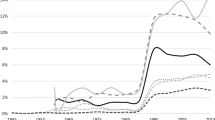Abstract
I discuss two versions of the doomsday argument. According to ``Gott's Line'',the fact that the human race has existed for 200,000 years licences the predictionthat it will last between 5100 and 7.8 million more years. According to ``Leslie'sWedge'', the fact that I currently exist is evidence that increases the plausibilityof the hypothesis that the human race will come to an end sooner rather than later.Both arguments rest on substantive assumptions about the sampling process thatunderlies our observations. These sampling assumptions have testable consequences,and so the sampling assumptions themselves must be regarded as empirical claims.The result of testing some of these consequences is that both doomsday argumentsare empirically disconfirmed.
Similar content being viewed by others
REFERENCES
Bartha, P. and C. Hitchcock: 1998, 'No One Knows the Date or the Hour-An Unorthodox Application of Rev. Bayes's Theorem', Philosophy of Science (Proceedings) 68, S339–5353.
Bostrom, N.: 1997, 'Investigations into the Doomsday Argument', available at the following URL: http://www. anthropic-principles. comlpreprintslinv/investigations.html.
Bostrom, N.: 2000, Observation Selection Effects and Probability, Ph.D. Dissertation, London School of Economics and Political Science, available at the following URL: http://www.anthropic principles. com/phd/.7
Caves, C.: 2000, 'Predicting Future Duration from Present Age-A Critical Assessment', Physics preprint archive asiro-ph/0001414 (January 24, 2000).
Edwards, A.: 1972, Likelihood, Cambridge University Press, Cambridge.
Forster, M. and E. Sober: 1994, 'How to Tell When Simpler, More Unified, or Less Ad Hoc TheoriesWill Provide More Accurate Predictions', British Journal for the Philosophy of Science 45, 1–36.
Forster, M. and E. Sober: 2003, 'Why Likelihood?' In M. Taper and S. Lee (eds.), The Nature of Scientific Evidence, University of Chicago Press, Chicago.
Goodman, S.: 1994, 'Future Prospects Discussed', Nature 368, 106–107.
Gott, R.: 1993, 'Implications of the Copernican Principle for our Future Prospects', Nature 363, 315–319.
Gott, R.: 1994, 'Replies', Nature 368, 108.
Gott, R.: 1996, 'Our Future in the Universe', in V. Trimble and A. Reisenegger (eds.), Clusters, Lensing, and the Future of the Universe, Astronomical Society of the Pacific Conference Series, San Francisco, vol. 88, pp. 140–151.
Gott, R.: 1997, 'A Grim Reckoning', New Scientist 2108, 36–39.
Hacking, I.: 1965, The Logic of Statistical Inference, Cambridge University Press, Cambridge.
Leslie, J.: 1990, 'Is the End of the World Nigh?' Philosophical Quarterly 40, 65–72.
Leslie, J.: 1996, The End of the World, Routledge, London.
Reichenbach, H.: 1956, The Direction of Time, University of California Press, Berkeley.
Royall, R.: 1997, Statistical Evidence-A Likelihood Paradigm, Chapman and Hall, London.
Sober, E.: 1987, 'The Principle of the Common Cause', in J. Fetzer (ed.), Probability and Causation: Essays in Honor of Wesley Salmon, Reidel, Dordrecht, pp. 211–228. Reprinted in E. Sober (ed.), From a Biological Point of View, Cambridge University Press, Cambridge, 1994, pp. 158-174.
Sober, E.: 1999, 'Testability', Proceedings and Addresses of the American Philosophical Association 73, 47–76. Also available at the following URL: http://philosophy.wisc edu/sober.
Sober, E.: 2001, 'Venetian Sea Levels, British Bread Prices, and the Principle of the Common Cause', British Journal for the Philosophy of Science 52, 1–16.
Van Valen, L.: 1973, 'A New Evolutionary Law', Evolutionary Theory 1, 1–30.
Author information
Authors and Affiliations
Rights and permissions
About this article
Cite this article
Sober, E. An Empirical Critique of Two Versions of the Doomsday Argument – Gott's Line and Leslie's Wedge. Synthese 135, 415–430 (2003). https://doi.org/10.1023/A:1023545820214
Issue Date:
DOI: https://doi.org/10.1023/A:1023545820214




